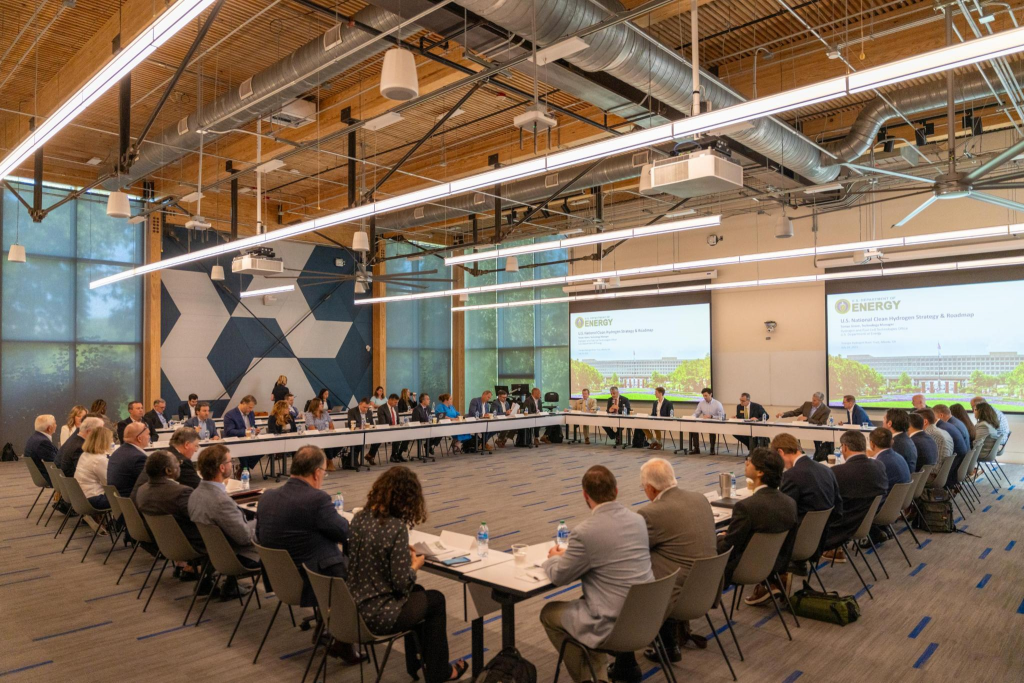Southeast Transportation Regional Initiative (SETRI)
EPIcenter is part of the SETRI coalition to advance transportation electrification throughout the Southeast. SETRI partners work together to:
1. Promote regional EV market development;
2. Conduct education and outreach to consumers and decision-makers;
3. Coordinate state electrification efforts and university research; and
4. Collaborate with transportation electrification efforts outside the Southeast.
This work will result in continued job growth as manufacturing facilities are developed across the region, improved energy security and resilience, improved air quality, new mobility options, and reduced energy burdens for low- and moderate-income populations.
Distinctive Characteristics & Strategies for an Energy Partnership to Focus on the Southeast Region
Energy challenges are global, national, and regional in scope. Developing appropriate definitions and identifying practical system boundaries are critical to developing solutions.
Innovation means different things in different regions. Each region has its own distinctive energy resource mix, demographics, industrial base, investment climate, and regulatory structure.
A number of significant demonstration and deployment opportunities exist in which national objectives can be deepened and accelerated via southeastern regional efforts.
These areas include:
- Large-Scale and Distributed Energy Storage
- National gas based distribution generation, including fuel cells
- Low-speed wind development
- High voltage DC power development
- Microgrids
- Community Solar
Click the link below to read more about energy in the Southeast. EPIcenter staff worked with Southern Company to develop a white paper entitled, Distinctive Characteristics and Strategies for an Energy Partnership to Focus on the Southeast Region.
Georgia Hydrogen Energy Braintrust
The Georgia Hydrogen Energy Braintrust was jointly founded by US Sen. Ossoff (GA) and Georgia Public Commissioner Tim Echols, alongside The Georgia Institute of Technology to strengthen energy security and attract new economic investment to the state, specifically with hydrogen energy.
Georgia is on track to become the nation’s advanced energy capital, powered by infrastructure and manufacturing incentives that are unlocking the full potential of our research, logistics, workforce, and entrepreneurial assets that make the state a leader in hydrogen, batteries, and electric vehicles. This has created a powerful ecosystem for economic development in the state and the Hydrogen Energy Braintrust and coordination among stakeholders will be the key to growing Georgia’s hydrogen energy resources and creating a more resilient and sustainable energy future.
In July of 2024, Sen. Jon Ossoff, Georgia Public Service Commissioner Tim Echols, and The Georgia Institute of Technology convened the third meeting of the Georgia Hydrogen Energy Braintrust at Georgia Tech’s Kendeda Building. The group included dozens of key leaders in the public and private sectors, including in energy, transportation and logistics, education and research, and more. The Braintrust will continue to meet on a recurring basis to discuss other key aspects of Georgia’s hydrogen future, including workforce development.

Georgia’s Model Solar Ordinance
Determining how and where to site different types of solar projects is a multi-step, multi-stakeholder process that can be confusing at best, and unnavigable at worst, creating a barrier to adoption.
To help county and city officials in Georgia efficiently navigate the multiple scales and types of solar energy systems available to them, Georgia Tech teamed up with Emory University and the University of Georgia to develop a model for solar zoning ordinances that community leaders can adapt to suit their needs, called the Model Solar Ordinance or MSO for short. This model ordinance provides a template to help cities and counties in Georgia draft development regulations for different solar energy system types and sizes. Provisions within the model ordinance address purpose, definitions, use permissions, and use-specific standards for rooftop, building-integrated, and three different sizes of ground-mounted solar energy systems.
Below are links to MSO resources.
- Georgia’s Model Solar Ordinance
- Model Solar Ordinance Guide
- Presentation – Model Solar Ordinance
- Solar Ordinance Resources
The Georgia Energyshed Project
At its essence, the multi-disciplinary Georgia Energyshed Project is a reimagining of the planning paradigm for electric power infrastructure. The hope is to help shape new models that are better suited to community needs and include input and decision-making at the local level. That data will then be used to inform policy decisions at the local level and the implementation of new ideas for the 11-county metro Atlanta area as defined by the Atlanta Regional Commission (ARC). The Georgia Tech team includes researchers from the School of Public Policy, the School of City and Regional Planning, and the College of Engineering.
To conduct the work, Georgia Tech is collaborating with key partners: the Atlanta Regional Commission (ARC), which has engaged in similar planning and modeling processes for regional water and transportation usage and trends; and the Southface Institute, a sustainability non-profit with extensive experience in outreach, and community engagement research. The Energyshed idea is modeled after the watershed concept, which takes a regional, solutions-based approach to address water demand and usage at the community level.
